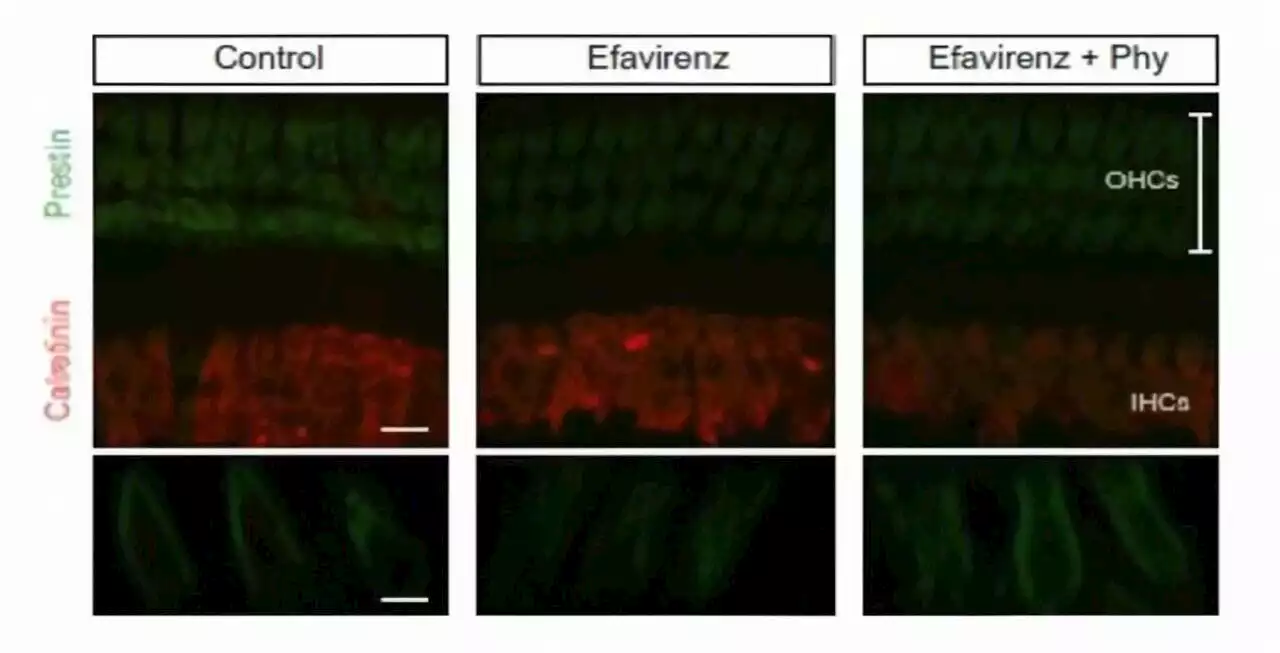Researchers report that age-related hearing loss is associated with a decrease of cholesterol in the inner ear.
First, the researchers measured the amount of CYP46A1 in inner ear OHCs because this enzyme helps break down and recycle cholesterol. As expected, they found more CYP46A1 in the inner ears of older mice than in younger mice, and consequently less cholesterol.
Next, they showed cause and effect by inducing hearing loss in young mice, as indicated by abnormal inner ear-cell output, by over-activating CYP46A1 with a drug. Finally, they tested whether increasing cholesterol in the brain could counter the drug. Since cholesterol itself cannot actually enter the brain from the blood, the researchers used plant-based cholesterol-like compounds called phytosterols which can. The young mice who got both the CYP46A1-activating drug and three weeks of dietary phytosterols displayed improved OHC function.
As phytosterols can be found in many over-the-counter supplements, they could be a convenient way to combat age-related hearing loss. However, directly testing their effects on hearing loss in older mouse models as well as in humans will be necessary before more definite conclusions can be made.
Belgique Dernières Nouvelles, Belgique Actualités
Similar News:Vous pouvez également lire des articles d'actualité similaires à celui-ci que nous avons collectés auprès d'autres sources d'information.
 UC researchers study parasite that causes Chagas diseaseAlmost everything about insects called kissing bugs is revolting, from the insidious way they bite people's faces at night to drink their blood while they sleep to the way they spread disease through their poop.
UC researchers study parasite that causes Chagas diseaseAlmost everything about insects called kissing bugs is revolting, from the insidious way they bite people's faces at night to drink their blood while they sleep to the way they spread disease through their poop.
Lire la suite »
 Taking adult education classes may lower risk of dementia, study suggestsResearchers analysed data from 282,421 people enrolled in the UK Biobank study.
Taking adult education classes may lower risk of dementia, study suggestsResearchers analysed data from 282,421 people enrolled in the UK Biobank study.
Lire la suite »
 Taking adult education classes may lower risk of dementia, study suggestsResearchers analysed data from 282,421 people enrolled in the UK Biobank study.
Taking adult education classes may lower risk of dementia, study suggestsResearchers analysed data from 282,421 people enrolled in the UK Biobank study.
Lire la suite »
 Call for remote areas to get better access to defibrillators after new studyResearchers said their study could guide where community defibrillators are placed.
Call for remote areas to get better access to defibrillators after new studyResearchers said their study could guide where community defibrillators are placed.
Lire la suite »
 Call for remote areas to get better access to defibrillators after new studyResearchers said their study could guide where community defibrillators are placed.
Call for remote areas to get better access to defibrillators after new studyResearchers said their study could guide where community defibrillators are placed.
Lire la suite »
 Neuroscientists create new resource to improve Alzheimer's disease research modelsA new study by Indiana University School of Medicine researchers uses more genetically diverse mouse models to study the accumulation and spread of abnormal tau protein deposits in the brain—a known sign of Alzheimer's disease and several other neurodegenerative diseases. The study's findings, recently published in the Journal of Experimental Medicine, could lead to better research models that improve understanding of how different genetic backgrounds influence neurodegenerative disease development and treatment needs.
Neuroscientists create new resource to improve Alzheimer's disease research modelsA new study by Indiana University School of Medicine researchers uses more genetically diverse mouse models to study the accumulation and spread of abnormal tau protein deposits in the brain—a known sign of Alzheimer's disease and several other neurodegenerative diseases. The study's findings, recently published in the Journal of Experimental Medicine, could lead to better research models that improve understanding of how different genetic backgrounds influence neurodegenerative disease development and treatment needs.
Lire la suite »
